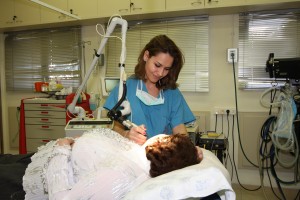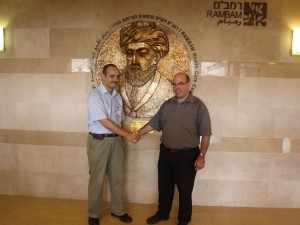The Rambam Health Care Campus in Haifa is one of Israel’s and the region’s leading hospital complexes.
This hospital has been at the forefront of encouraging and promoting excellence among the country’s Arab medics and also promoting women to leading roles..
Previously Dr Suheir Assady became the first Israeli Arab woman to be the head of a department.
This video is of the very impressive and charming Dr Assady as reported by Israel21c.com.
Today there was news of another female doctor becoming the first Arab woman plastic surgeon in Israel. Her name is Dr Rania El Hativ.
As Israel’s first Arab woman to become a plastic surgeon, Dr. Rania El Hativ represents a professional role model for others like herself. Further, the 28 year-old Rambam Health Care Campus (RHCC) doctor is confident that her presence will encourage more female patients from her sector to seek the medical care they need.
“While there is growing openness to plastic surgery among the Arab population, the field is still relatively unknown,” says Dr. El Hativ. “In addition, Arab women may be hesitant to reveal bodily defects to male doctors, and may neglect serious problems. Just by being there, I hope to make it easier for Arab women to undergo examinations for plastic surgery procedures.”
For Dr. El Hativ, work is a calling. “I want to raise awareness of plastic surgery in the Arab sector, where it is not well known and accepted,” she says. “Everyone is a member of a specific society, and should contribute. You cannot only think on a personal level, you must also give.”
Dr. El Hativ stresses that plastic surgery is far more than facelifts and breast enhancements. “Our work is incredibly diverse,” she says. “It involves treating a range of problems like war injuries, tumors, burns and cleft palates, as well as providing breast and facial reconstruction for cancer patients,” she says.
While Rania does not perform any exclusively cosmetic procedures, she does operations that involve aesthetic, medical, and emotional aspects. For example, rhinoplasty, commonly known as “nose jobs”, can cure breathing difficulties. Liposuction, on patients who have lost a great deal of weight, eliminates fungi between hanging folds of flesh. Breast reconstruction restores a natural look to women who have undergone mastectomy, while reductions ease the back problems of those with large breasts. Procedures can restore normal appearances – and lives – of patients with oral tumors who were left with exposed teeth and gums.
In addition to the discipline’s variety and ability to ease suffering, its creative aspects attract Dr. El Hativ. “Treatments in other fields of medicine go by the book, but in plastic surgery you can insert your own personality. There are thousands of ways of doing an operation, and plastic surgery demands an artistic view,” says the young surgeon, who incidentally, loves to draw.
Rania adds that empathy and connection are also crucial in her field. “Without the personal touch,” she says, no patient will ever be one hundred percent satisfied.” Likewise, plastic surgery demands a special open-mindedness, and the courage to try new techniques. ”This profession has no boundaries,” she says. “Plastic surgery is a sea without end.”
Also today, a press release told of the story of a Jordanian doctor, Dr. Kamal Hafiz, who came to the Rambam on a fellowship. He has now returned to Jordan.
This is a testament to the standing of Israeli medicine and the part it does and can continue to play in promoting peace, understanding and co-operation through medicine.
Dr Kamal Hafiz [on the left in photo above with Dr. Zohar Keidar, Deputy Director of Nuclear Medicine & PET/CT Institute at RHCC], a specialist in general surgery from Jerash Hospital in Jordan, recently completed an acute care surgery fellowship at Rambam Health Care Campus (RHCC). The first Jordanian surgeon ever to participate in such a program, Dr Hafiz remained for a year at Rambam, gaining crucial skills which he currently applies in his own place of work.
Dr Hafiz was first drawn to RHCC by its reputation as a top notch acute care center, with wide-ranging experience. Acute care is a specialty that combines trauma surgery and general emergency surgery. Likewise, the Jordanian doctor was impressed by the positive reports of a colleague, who in 2006, participated in a course in Rambam on trauma care for Jordanian doctors and nurses. Contributing to Rambam’s attractiveness was its proximity to Jordan. In less than two hours, Dr Hafiz could be in Jerash with his family, which he visited once every three weeks.
Starting his fellowship with an intensive Hebrew course, Dr Hafiz gained a rudimentary command of the language before beginning his spell at Rambam. Once settled in RHCC, performed general surgery and joined surgical teams for emergency procedures. During the last four months of his year at Rambam, Dr Hafiz became a medical staff member, and did patient rounds. “Being in Rambam was a very worthwhile experience, which helped me enrich my surgical practice,” says Dr Hafiz, who worked primarily with Director of the Department of General Surgery Prof Yoram Kluger, Director of Acute Care Surgery Dr Hany Bahouth and Director of the Hepato-Biliary Surgical Service Dr Arie Arish. In regular correspondence with these Rambam surgeons, Dr Hafiz says he “will never forget the staff of Rambam.”
“Dr Hafiz knew that Rambam deals in high volume of trauma and emergency surgery. He realized he was in a good place with good people, and learned things that answer needs at home,” says Dr Bahouth, who did his own fellowship in emergency and critical care at Ryder Trauma Center in Miami, USA.
Prior to Dr Hafiz’s visit, two delegations of 13 doctors and nurses each came from Jordan to Rambam for two weeks of training in trauma care and building trauma systems. Held in 2006 and 2009, these courses were arranged as a joint effort between the Jordanian government and the Israel Ministry of Foreign Affairs.
“I would like to have the chance to come back to Rambam because I learned a huge amount of medicine and gained hands-on practice from some of the best surgeons in the region,” says Dr Hafiz, who also commented on the bigger picture: “I hope the collaboration will continue between doctors from Israel and Jordan.”
Behind the rhetoric there are real people who can promote peace through this kind of co-operation and exchange of expertise.
*Photo credit: Pioter Fliter-RHCC

